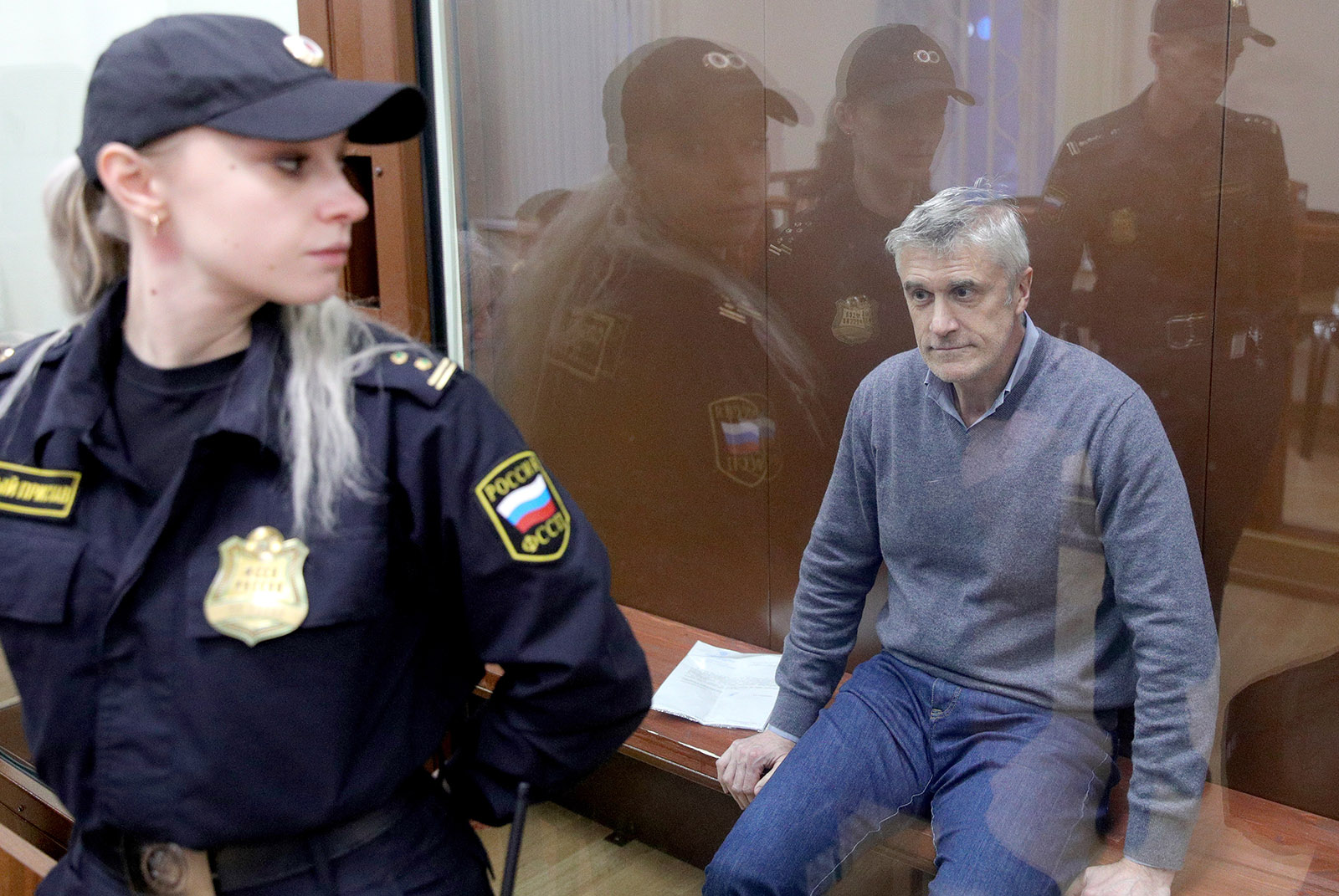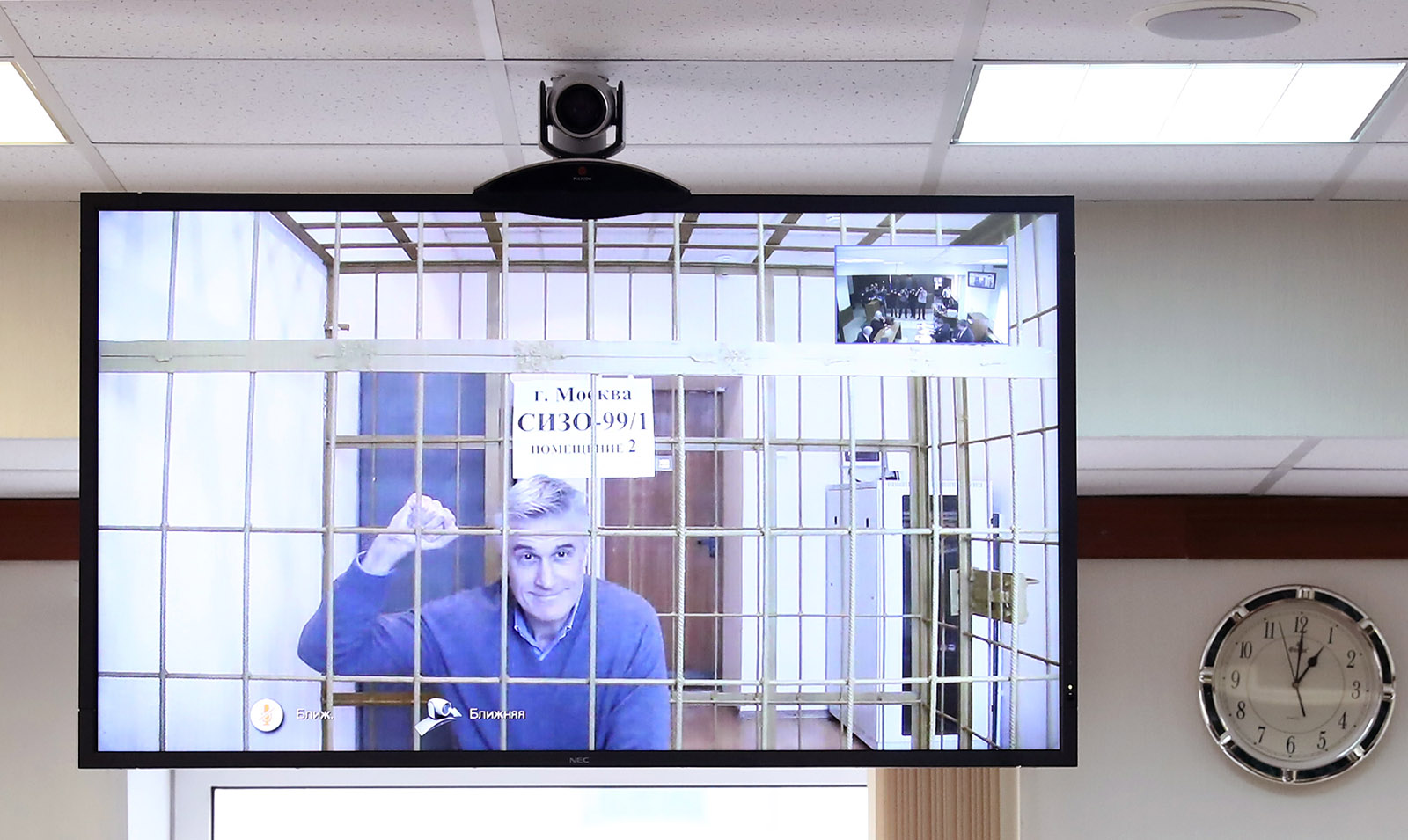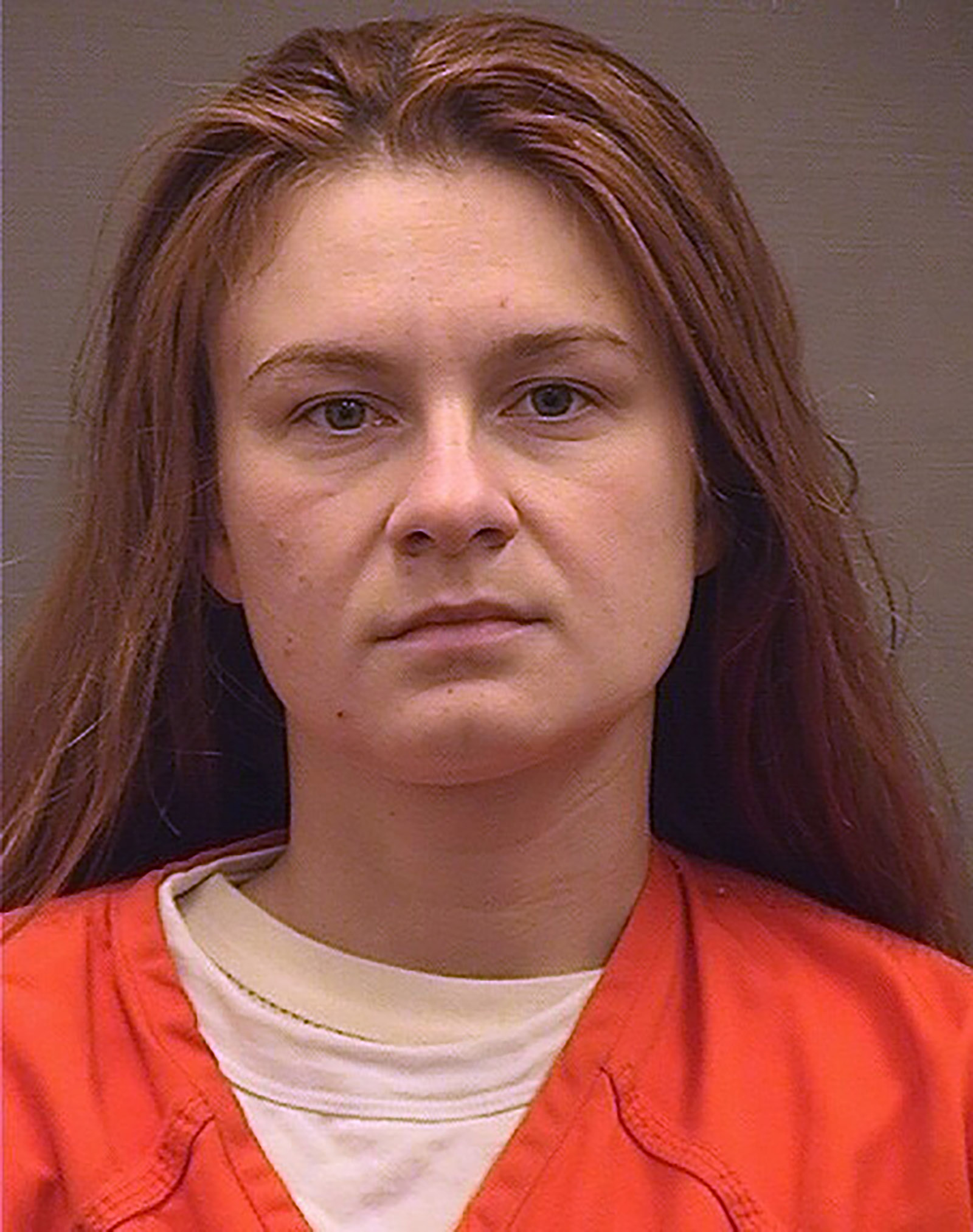On Thursday, a Moscow court denied an appeal by defense lawyers for American financier Michael Calvey requesting his release on bail pending a mid-April hearing on serious fraud charges that carry a possible sentence of up to ten years’ imprisonment. Calvey, the founder of Baring Vostok Capital Partners, one of Russia’s oldest and largest investment firms, was arrested on February 14, along with five colleagues, for allegedly defrauding Vostochny Bank, in which Baring Vostok has a majority stake (52.5 percent), of 2.5 billion rubles (or about $38 million).
The very day of Calvey’s stunning arrest, the Russian Investment Forum, a platform for promoting Russia’s business and investment opportunities, was holding its annual meeting, in Sochi, attended by world business leaders and top Russian officials. Just days later, in his 2019 state of the nation speech, Russia’s president, Vladimir Putin, declared that “we must rid the system of everything that restricts freedom of enterprise and business initiative. Honest businesses should not face the risk of criminal or administrative prosecution.” Just as incongruent was Putin’s statement that “we need to strictly limit the grounds for extending the term of detention during the investigation of so-called economic criminal cases.”
In a further stroke of irony, the man behind Calvey’s arrest, a Vostochny Bank shareholder named Artem Avetisyan, is the chairman of Russia’s “Leaders’ Club,” a Kremlin-sponsored group of entrepreneurs whose purpose is to improve the country’s investment climate; he is also the director of new business for the Agency for Strategic Initiatives, an organization, headed by Putin, that sponsors investment projects.
Ominously for Calvey, the judge who first ordered his detention, Artur Karpov, was the same judge who participated in the prosecution of Sergei Magnitsky, the lawyer who died in detention in 2009 and whose name has been made famous by the US sanctions law championed by businessman Bill Browder. (Karpov himself was sanctioned under this law.) Calvey is being held at Matrosskaya Tishina, the prison, notorious for its poor conditions, where Magnitsky died. Contrary to penitentiary regulations that call for those accused of economic crimes to be housed separately, Calvey is in an eight-person cell together with at least one prisoner accused of attempted murder.
Calvey’s detention has caused alarm in the Russian financial community. The former Russian finance minister Alexei Kudrin, German Gref, chief executive of Sberbank, and Kirill Dmitriev, head of the Russian Direct Investment Fund, have all publicly protested the detention and vouched for Calvey. This makes the virtual silence of the US State Department, which has made no comment on Calvey’s case beyond acknowledging the fact of his arrest, all the more shocking. Nor has there been a squeak of criticism for the Russian action from the White House, whose current occupant, as we’ve been learning, still had ambitions to do business in Moscow as he was running for president.
Born in 1967, and raised in Oklahoma, Calvey earned a master’s degree in finance and accounting from the London School of Economics, and later worked for Salomon Brothers and then for the European Bank for Reconstruction and Development. He is currently a board member of the Washington-based think tank Atlantic Council. Baring Vostok, the firm Calvey founded in 1994, has invested more than $2.8 billion into some eighty Russian and Commonwealth of Independent States (CIS) companies. Besides investing in financial services, oil and gas, telecommunications, and media, Baring has been a major shareholder in Yandex, Russia’s most popular search engine.
According to Bloomberg News columnist Leonid Bershidsky, “Calvey became a legend in the Russian market, in part because of his reputed aversion to any kind of foul play and focus on industries and companies unlikely to attract the attention of Russia’s authorities.” Back in 2005, Calvey was asked about the 2003 arrest of the head of the oil company Yukos, Mikhail Khodorkovsky. “Of course, the Yukos case scared away some investors,” he said, with what now seems false assurance. “But those who have invested money in our fund are confident that Yukos is a completely separate case… The political risk in such investments is much lower.”
But Baring Vostok’s risk-averse strategy ran into trouble in early 2017 when the firm’s bank, Vostochny Express, joined with another, Uniastrum, that was controlled by Avetisyan and his partner Sherzod Yusupov, to form the Vostochny Bank. The criminal complaint against Calvey and his associates, filed with the FSB by Yusupov, stems from Vostochny Bank’s purchase of a majority holding in a Luxembourg company, International Financial Technology Group (IFTG), from a company owned by Calvey to pay down a $38 million debt to the Vostochny Bank.
At the time of the transaction, the bank estimated the market value of the shares at about $45 million, but the criminal complaint claims that they were actually worth a paltry $10,000 and thus that the transaction was a deliberate fraud. But according to the BBC Russian Service, which obtained documents on the case, that lower sum was based on an evaluation by Luxembourg lawyers made in May 2018, when there were restrictions on the dividends paid from IFTG shares. These were lifted in September, making that valuation irrelevant. Also, according to IFTG documents, the Luxembourg company’s net assets at the end of 2016—just weeks before the Vostochny acquisition—were worth $37 million, in addition to which the company was holding $4.8 million in cash.
Advertisement
When he appeared in court just after his arrest, Calvey explained in his fluent Russian that there had been some technical errors in the charter of IFTG, but insisted that all the bank’s shareholders, including Yusupov and Avetisyan, had had access to the same data and had approved the transaction. Calvey told the court that the real motive for the charges was retaliation over a separate conflict between Baring Vostok and Avetisyan, against whom Baring Vostok had itself filed a lawsuit for fraud in the London Court of International Arbitration. Avetisyan, Calvey said, had stripped Uniastrum of assets before the merger with Vostochny Express and wanted to pressure Calvey to withdraw the suit, as well as to prevent him from diluting Avetisyan’s stake in Vostochny Bank.
Calvey has a reputation both as a tough, savvy businessman and as an honest straight-shooter. So how did Avetisyan succeed in engineering Calvey’s arrest?
The answer, as several analysts have pointed out, is that Avetisyan has extremely close ties to the Kremlin, including among the siloviki, the security and law enforcement establishment. In 2011, Putin appointed Avetisyan to the board of the Agency for Strategic Initiatives; this ensures that Avetisyan meets regularly with Putin himself, who chairs the agency’s advisory board, as well as other senior government and financial figures. Thanks to this sinecure, Avetisyan is now on the board of directors of several leading Russian companies, including Russian Railways and the Russian Agricultural Bank, headed by his friend Dmitry Patrushev, son of the former FSB chief Nikolai Patrushev. Avetisyan also belongs to a working group attached to the Prosecutor General’s Office and is on the advisory public council of the FSB.
Avetisyan’s own record as a businessman, however, is checkered, to say the least. His plan had been to create an investment vehicle by uniting Vostochny Express and two other weak banks with Uniastrum and then obtain support from the Russian state. According to the Russian online publication The Bell, Putin initially gave his approval to this plan in 2016, but it ran into objections from shareholders and government officials, and ultimately fell through. In November 2017, according to The Bell, the credit-rating agency Fitch lowered the Vostochny Bank’s ratings to “default” because the bank’s capital position was so eroded by the merger with Uniastrum.
After an audit by the Russian Central Bank in December 2018, Vostochny was ordered to increase its reserves by around $300 million, which called for an additional share issue. Avetisayn opposed this because, as he was unwilling to invest more himself, his shares would be diluted. Amid these difficulties, Avetisyan began taking out his frustrations on the media, which had been reporting critically on his troubles, issuing a dozen or so defamation suits against news outlets. The court dismissed them all last year.
But last month, Avetisyan met with far more significant success in enlisting the FSB to go after Calvey and his associates. “Calvey has been suing Avetisyan in London, and he was winning the case,” the Russian journalist Yevgenia Albats told me this week in an email. “Hence, for Avetisyan to secure his standing, putting Calvey in jail was the best if not the only option.”
She added, “the decision was taken by Nikolai Patrushev, whose son is Avetisyan’s friend.” Nikolai Patrushev, now secretary of Putin’s Security Council, is a long-time Putin ally. Though he doubtless still wields considerable authority over the FSB, the agency he led for a decade, he would not have ordered the arrests without Putin’s approval—though Putin reportedly denied this when asked, at a closed-door meeting last week, about the Calvey case and the damage it might do to the investment climate. The investigators’ claims that Calvey and his associates had stolen a large amount of money could not be ignored, he said, and pretrial detention was sometimes justified in business cases.
Does Putin not worry about the chilling effect these arrests will have on Western investment in Russia? According to Bloomberg’s Bershidsky, Western sanctions have so reduced the flow of foreign capital, which fell to just $2.4 billion in the first nine months of 2018 (from $25.8 billion over the same period in 2017), that the Calvey case will hardly matter. More importantly, as Russian journalist Mikhail Fishman observed this week: “When it comes to economic policy, when it comes to any kind of conflict… the president always chooses the special services.” Putin makes this choice for a reason—namely, that he depends on the FSB to remain in power. In the words of the Russian writer and radio host Viktor Shenderovich: “To lose the support of Patrushev and what stands behind him… would be a much greater threat for Putin than the collapse of the investment climate in Russia.”
Advertisement
Avetisyan, by now a seasoned player in Russia’s financial and government circles, apparently understood this axiom better than Calvey, who, despite his decade and a half of working in Russia, seemed to assume that he and his firm were immune to threats from Putin’s corrupt siloviki. “Did he think he was in Denmark?” Shenderovich wondered about Calvey. “He hoped that the lawlessness would only affect others, and not him. But he was wrong.”
It may be that the Kremlin’s decision to arrest Calvey (and perhaps also the American in Russian custody on spying charges, Paul Whelan) was intended to pressure US authorities, who have been holding the Russian agent Maria Butina in jail since last summer. Butina, who pleaded guilty to conspiring against the United States, has been cooperating with prosecutors and will remain in custody for at least another month. In contrast to our State Department’s silence on Calvey, the Russian Foreign Ministry has a photo of Butina at the top of its Twitter account. And Putin himself has spoken out to insist that Butina is not a spy.
Of course, we are not privy to what might be going on behind the scenes between Washington and Moscow. But if there is dialogue, it is not helping Calvey. Last Friday, the Russian television channel TV Rain, citing sources close to the Kremlin, reported that Calvey’s firm, Baring Vostok, is suspected of financing the nationwide protests that occurred before the 2018 Russian presidential elections.




